July, Too, Is Busting Out All Over
Even as we say farewell to the S.F. Symphony and S.F. Opera seasons (with final performances this week, including one more Nixon in China, see item below), a quick look at the calendar should console the music-hungry multitudes of varied appetite:
Schwabacher Summer Concert

The 2012 Merola Opera Program opens with the Schwabacher Summer Concert, on Thursday in Herbst Theatre, and the program repeats at the annual free outdoor concert, on July 7, in Yerba Buena Gardens. Conducted by S.F. Opera's Giuseppe Finzi, the concerts feature scenes from Donizetti’s Anna Bolena, Boïto’s Mefistofele, Bizet’s La jolie fille de Perth, and Stravinsky’s The Rake’s Progress.
Nagauta at the Asian Art Museum
On Saturday, the Asian Art Museum's Phantoms of Asia exhibit will host three hours of "Nagauta: Music of Kabuki Theater," beginning at noon. Dating to the early 17th century, nagauta ("long song") is one of the three music types accompanying Japanese kabuki performances. Now recognized as an independent music genre, it is played with shamisen (a banjo-like string instrument) and hayashi (percussion). Shamisen musician Katsushichiro Kineya and group SHAZUMI will perform. The event is co-presented with Satsuki Kai and Japan Society of Northern California.
Les Miz Times 25

Photo by Claire Rice
On July 10, yet another run of Boublil & Schönberg's Les Miserables opens in the Orpheum, a special one — this is the Cameron Mackintosh presentation of a new, 25th anniversary, production. The new staging and reimagined scenery inspired by the paintings of Victor Hugo received critical praise on Broadway.
Festival del Sole Opens
Festival del Sole’s seventh season will have its opening night on July 13 in Castello di Amorosa, featuring mezzo Susan Graham and the Philharmonia Baroque, conducted by Nicholas McGegan. The gala event includes a reception in the castle's tower overlooking Napa Valley before the concert, and dinner after, in the castle's ornate barrel room.
Behold the Demon Barber of Fleet Street
The same date, July 13, is opening night for Stephen Sondheim's Sweeney Todd in the Eureka Theater, produced by the Ray of Light company, notable for excellent recent productions of such other works at the cusp of opera and musical as Assassins, Jerry Springer the Opera, Baby: A Musical, and Tommy.
London Stage and Film Stars in Napa
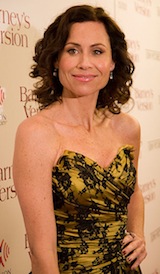
July 14 marks the Festival del Sole premiere of 24 Hour Plays, in Lincoln Theatre, starring film and theater actors creating, learning and performing four short plays in the space of a day, with musical interludes from Vivaldi's Four Seasons, performed by the Russian National Orchestra. The amazing cast includes Hugh Dancy, Minnie Driver, Dennis Haysbert, Michael Keaton, Chris Noth, Amy Povich, Andrea Anders, and others. (Previously announced, Naomi Watts and Liev Schreiber had to cancel because of scheduling conflicts.)
'The Mystery of Krishna'
Abhinaya Dance Company's principal dancer Rasika Kumar presents "Maya: the Mystery of Krishna" on July 15, in Saratoga's McAfee Theater. The dancer and Artistic Director Mythili Kumar have created a production including stories from Krishna's life. Flautist G.S. Rajan joins a group of Bay Area musicians, including Asha Ramesh, Shanthi Narayanan, N. Narayanan, and Malavika Kumar for this event.
And that's just the first two weeks of the month that used to be slow ...
Nixon (the Opera) Mania
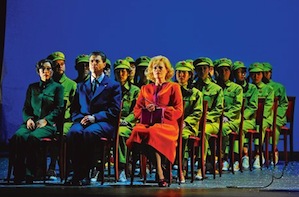 Honest to goodness, there is a posting today on an opera site: "Desperately seeking two tix for Nixon in China at San Francisco Opera on July 3rd at 7:30 p.m., central orchestra or central box seats, name your price!"
Honest to goodness, there is a posting today on an opera site: "Desperately seeking two tix for Nixon in China at San Francisco Opera on July 3rd at 7:30 p.m., central orchestra or central box seats, name your price!"
To this we have come. If you don't believe it, check the S.F. Opera website for this final performance of John Adams' opera, which has been getting nothing but rave reviews; the subject of fascination. It's all soldout in the 3,200-seat War Memorial (except for a half dozen box seats as of this writing, apparently eluding the desperate poster).
During the seven-performance run, the production attracted more and more interest, and larger audiences, including young folk — the heart's desire for general directors, emphatically including the one responsible for the Nixon mania, San Francisco Opera's David Gockley.
As far as today's last performance is concerned, there are still $10 tickets in standing room, and going beyond the loss of the summer season's unexpected sensation, you can watch the fine 2012 Paris production for the next couple of next weeks. And then, we'll all go into rehab.
Curiously, Gockley did not initially mention Nixon among the Rising Alternative distributor plans, which sends S.F. Opera productions to 450 theaters worldwide. He will "look to the time when they are up to 1,000 venues, and then the money becomes substantial enough." Specifying The Tales of Hoffman "live around the world in June of 2013," when it opens at the War Memorial with Natalie Dessay leading the cast, Gockley did not mention the Adams opera, which is clearly the apple of his eye — and the labor of love from the company's five-year-old in-house Koret Media Suite, the high-definition broadcast-standard video production facility.
Farewells at End of SFS Centennial Season
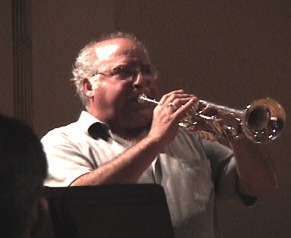
"Mahler symphonies are a dream to play because they’re full of melodic brass solos, and the writing is amazing," Glenn Fischthal once said, the San Francisco Symphony trumpet player, understandably focusing on the difficult and magnificent brass solos. We in the audience were lucky to hear Fischthal for 32 years — 24 of them as principal trumpet, recently as associate principal, and occupant of the Peter Pastreich Chair.
Fischthal is one of the veteran musicians retiring with the end of the season, along with principal percussionist Jack Van Geem (31 years) and violinist Frances Jeffrey (21 years).
Fischthal's favorite works featuring the trumpet include Mahler's Fifth Symphony (no one who heard the work here in 2001 will ever forget his and the orchestra's magnificent performance), Prokofiev's Fifth Symphony No. 5, the Bartók Concerto for Orchestra, and Stravinsky's The Rite of Spring. He has had a global career, was member for extended periods of ensembles in Canada, Kansas City, Hong Kong, and San Diego; for three years, Fischthal served as principal trumpet of the Israel Philharmonic.
Van Geem played clarinet, bassoon, trombone, tenor saxophone, recorder, and piano ("It became a hobby to see how good I could get at a new instrument") before becoming a percussionist, first with the San Francisco Ballet Orchestra, and then with SFS. The soloist in Michael Tilson Thomas’ Island Music, Van Geem is a serious cabinet maker, an occupation he learned from his grandfather. "When I wasn’t banging on wood — practicing the marimba — I was driving nails through it." He is percussion chair at the San Francisco Conservatory of Music.
Jeffrey studied at the Juilliard School with Joseph Fuchs, and concentrated on chamber music under the tutelage of Felix Galimir, of the Juilliard String Quartet. She played with the Atlanta Symphony from 1972 through 1990, when she joined SFS. She has also performed with Kramer and Dekkers Ensembles, and the Georgian Chamber Players. Jeffrey is married to SFS violinist Robert Zelnick; the couple is one of the orchestra's five husband-and-wife teams.
Midsummer Mozart's Dream
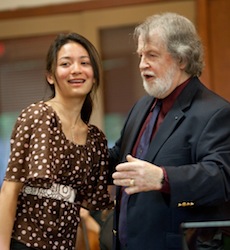 As Midsummer Mozart Festival Co-founder, Director, and Conductor George Cleve prepares for the 38th season, he easily remembers the festival's first rehearsal: "It was on my 39th birthday and we were working on Mozart's Symphony No. 39." As to persisting with a festival devoted to a single composer all these years, Cleve's verdict on the success of the effort: "miraculous."
As Midsummer Mozart Festival Co-founder, Director, and Conductor George Cleve prepares for the 38th season, he easily remembers the festival's first rehearsal: "It was on my 39th birthday and we were working on Mozart's Symphony No. 39." As to persisting with a festival devoted to a single composer all these years, Cleve's verdict on the success of the effort: "miraculous."
In the beginning, Vienna-born Mozart specialist (and former San Jose Symphony music director) Cleve, co-founding musicians Wendell Rider and Robert Hubbard, and the entire orchestra prepared and performed on a "business risk basis," meaning that they wouldn't get paid if expenses exceeded income. "We knew we might not make any money," Cleve says, "but it turned out to be a rousing success artistically, and we were on our way."
Now, in the festival's fourth decade, concerts are given around the Bay Area, with a large, loyal audience and enthusiastic supporters. The 2012 season's first program runs July 19-22 in four venues (San Jose's California Theatre, Berkeley's First Congregational Church, Sonoma's Gundlach Bundschu Winery, and San Francisco's Herbst Theatre), featuring the Impresario Overture, Six German Dances, the Piano Concerto in G, with Audrey Vardanega as soloist, "Vorrei spiegarvi, oh Dio," with soprano Rebecca Davis; and the Symphony in D ("Prague").
The second program, July 26-29, offers The Magic Flute Overture, "A te, fra tanti affanni," from Davide penitente, with tenor Christopher Bengochea, Piano Concerto in E Flat, with Seymour Lipkin as soloist, and the "Great" Mass in C Minor, with sopranos Davis, Christina Major, tenor Bengochea, bass Kirk Eichelberger, and Lynne Morrow's Pacific Mozart Ensemble.
Cleve speaks of the Mass with intimate knowledge and enthusiasm:
It's unlike anything Mozart wrote in this genre, and just as his other large liturgical work — the Requiem — it's unfinished. What remains has amazing grandeur in this 45-minute "torso," an authentic edition by the late H.C. Robbbins Landon, which makes no attempt to second-guess how Mozart might have completed it.The program includes one of the Davide penitente arias not part of the reconstructed Mass.The Mass disappeared for many years, and scholars discovered only centuries after its completion that Mozart used a great deal of the music in the oratorio Davide penitente, so from there and other sources, they reconstructed it, at least in part.
Cleve's passion for Mozart history is trumped by his interest and involvement in the present and future of young musicians. Four years ago, when Crowden School asked him to coach a student trio, Cleve came upon a "Italian-Chinese pianist from Oakland, looking about 14, with an astounding natural feeling for Brahms, an 'old soul' playing."
Audrey Vardanega turned out to have just passed 12, but she started big, playing the solo in a Mozart piano concerto with the festival, as she will later this month, at age 16. She also plays the violin, was assistant concertmaster of the Mozart Youth Camerata, and playing the violin on the San Francisco Symphony Youth Orchestra's current European tour. She is also a promising composer, and in her spare time, Vardanega and friends set up an organization called Kids for Children that gives benefit concerts to raise money for the Children’s Hospital of Oakland.
Vardanega's solo in the Piano Concerto K. 467 with the Academy is on the festival's website.
'Our Brünnhilde' from Munich, in Free Streaming

Conducted by Kent Nagano, the new production by Andreas Kriegenburg, features Nina Stemme — star of last year's San Francisco production — as Brünnhilde, Stephen Gould as Siegfried, Wolfgang Koch as Alberich, and Iain Paterson as Gunther.
The live transmission of Götterdämmerung is part of a pilot project by General Manager Nikolaus Bachler in presenting opera online, following live-streams of Fidelio, L’elisir d’amore, Don Carlo, Eugene Onegin and I Capuleti e i Montecchi.
Intermezzo reports there have been some problems with the otherwise well received new Munich Ring cycle:
Anyone tuning in to the radio broadcast of the Bavarian State Opera's new Die Walküre may have been perplexed by the start of the final act. Instead of music, there was stomping and banging — soon nearly drowned out by booing and shouts of "Music!" and "We want to hear Wagner!"What happened was that Valkyries in silver minidresses performed a silent tap dance overture before the music [the "Ride of the Valkyries"] began. The problem was perhaps not the dance itself, but the fact that it went on for what seemed like 10 minutes.
Music and Dance at S.F. Jewish Film Festival
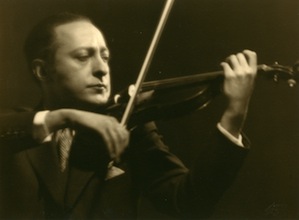
This year's San Francisco Jewish Film Festival, in various venues between July 19 and Aug. 6, is offering plenty of music and dance.
Beginning with Roberta Grossman's Hava Nagila (The Movie) (no joke, that's the title) and ending with A.K.A. Doc Pomus, the 32nd festival deals with 5773 years of culture.
The song "Hava Nagila" originated in Ukraine as a nigun, a wordless Hasidic melody that traveled with immigrants to Jerusalem at the turn of the 20th century and acquired Hebrew lyrics and a circle dance based on the Romanian Hora. From there, the song journeyed to America, where it sped up, lost some of its connotations as an Israeli song and exploded in popularity.
Doc Pomus was a most unlikely rock-n-roll icon. Paralyzed with polio as a child, Brooklyn-born Jerome Felder reinvented himself first as a blues singer, renaming himself Doc Pomus, then as a songwriter, creating some of the greatest hits of the early rock and roll era: "Save the Last Dance for Me," "This Magic Moment," "A Teenager in Love," "Viva Las Vegas," and a thousand others. The documentary features a cast including Dr. John, Ben E. King, Lou Reed, Joan Osborne, Shawn Colvin, Dion, Jerry Leiber and Mike Stoller, and B.B. King.
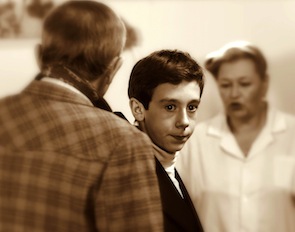
Also at the festival:
* God's Fiddler, Peter Rosen's documentary about Jascha Heifetz
* Gypsy Davy, Rachel Leah Jones’ portrait of her father, the celebrated flamenco guitarist (and Berkeley High School grad) David Serva
* Joel Berlinger's Under African Skies, about Paul Simon's reunion concert in South Africa for the 25th anniversary of Graceland
* Amiel Courtin-Wilson's Ben Lee, Catch My Disease, chronicles the still unfolding career of Lee, who started the band Noise Addict at age 14, and became a pop star by the time he was 16
* Caleb Heller's Y-Love is the portrait of "an ultimate outsider: a black, gay, Orthodox Jew who raps"
* Dimitry Povolotsky’s affectionate and quirky comedy My Dad Is Baryshnikov tells the story of a young man in the Bolshoi Ballet Academy claiming the great dancer as his father
Opera Statistics to Ponder
Operabase's study of more than 100,000 productions between 2005 and 2010 shows some 300 world premieres, The Magic Flute beating out La traviata for the title of most performed opera, followed by Carmen, Bohème, and The Marriage of Figaro.
Shostakovich's Lady Macbeth (No. 73) topped Britten's Turn of the Screw (No. 81) as the most frequently programmed opera from a composer born in the 20th century. There were two works by living composers in the top 200 most frequently produced works: Grigory Frid's monodrama The Diary of Anne Frank (No. 158), and Jake Heggie's Dead Man Walking (No. 196). What, no John Adams?!

